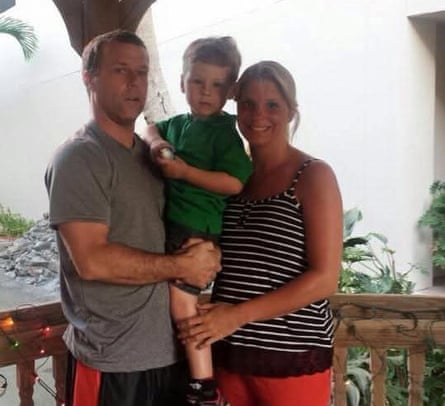Losing Ben on the age of 8 weeks within the paediatric crucial care unit of the Bristol Royal medical facility for teenagers within the springtime of 2015 was distressing and heartbreaking for Jenny and Allyn Condon.
In the one decade on condition that, they declare their discomfort has really not relieved nonetheless, if something, has really been made further extreme by the way they’ve really been handled by a wellness rely on as they campaigned to find why Ben handed away.
“It has destroyed me,” claimed Jenny, that tried to eradicate herself and has post-traumatic stress and anxiousness dysfunction. “I’m a broken woman. I’m in constant fight or flight.”
Speaking on the finish of a two-week inquest that wrapped up on Friday– which laid naked failings in Ben’s therapy and was steadily inconsistent, intricate and, as his mothers and dads see it, adversarial– Allyn claimed their priceless recollections of Ben had really been eradicated by the strategy of the rely on that runs the medical facility.
“Up to the point he went into Bristol, Ben was a very well baby,” claimed Allyn, a earlier Olympic skilled athlete. “We had good memories of Ben. Over the 10 years since, they’ve evaporated those good memories, they’ve taken every good memory.”
Ben was birthed too quickly on 17 February 2015. In April, he created respiration troubles and was required to the children’s medical facility, the place physicians recognized human metapneumovirus (hMPV), a respiration an infection. He decreased swiftly, had 2 coronary heart assaults on 17 April and handed away.
The Condons have been rapidly knowledgeable that no postmortem analysis was required as the rationale of fatality was easy. Doctors tape-recorded extreme respiration misery dysfunction (ARDS), hMPV and prematurity on his fatality certification and his physique was cremated. But numerous weeks after Ben died his mothers and dads have been knowledgeable that he likewise had a microbial an infection.
A really first inquest, in 2016, wrapped up that 2 respiration illnesses and prematurity created Ben’s fatality, nonetheless the next yr, after the Condons remained to push, the University Hospitals Bristol and Weston NHS Foundation Trust confessed {that a} failure to give him antibiotics in a timely manner for the microbial an infection added to his fatality.
In 2021, the NHS ombudsman claimed Ben handed away after “a catalogue of failings” in his remedy and there was an effort to “deceive” his mothers and dads. The excessive court docket subdued the verdicts of the preliminary inquest and a brand-new inquest has really occurred at Avon coroner’s court docket close to Bristol.

On Friday, the coroner that has really listened to the 2nd inquest, Robert Sowersby, backed the Condons’ concept that the fatality certification and verdict of the preliminary inquest have been inadequate.
He dominated {that a} pseudomonas microbial an infection, together with each respiration illnesses and prematurity, created his fatality.
Sowersby, the aide coroner for Avon, specified that in between 14 and 16 April professionals decided to not provide Ben anti-biotics. Sowersby claimed: “I find Ben should have been given antibiotics by 16 April at the latest,” and included that if he had really been offered anti-biotics it might definitely have give up the pseudomonas an infection getting into his blood stream.
The coroner claimed some paramedics had a “patronising approach” to Ben’s mothers and dads which Jenny and Allyn weren’t knowledgeable what was happening or why and weren’t related to important decisions. He claimed it was “hard” to acknowledge a hold-up in informing them precisely how ailing Ben was.
Sowersby claimed: “A lot of mistakes were made. The actions of various employees who were involved in Ben’s care or in subsequent investigations understandably aroused suspicion and contributed to the family’s inability to believe anything they were being told.”
He likewise criticised precisely how some medical facility personnel offered proof to the inquest, claiming that they had really refrained all they may to help him pretty analyze what had really taken place.
He wrapped up: “I hope that perhaps Ben’s family can take some tiny element of pride in what they have achieved in their battle for the truth.”
Jenny, 43, claimed: “He should have had a postmortem. If that had been done properly none of this would have happened.”
Troubling proof that appeared all through the inquest consisted of the pointer that tissue samples may have been taken from Ben after he died— his mothers and dads assume for screening– though they have been knowledgeable that the rationale for his fatality was so easy that no postmortem analysis was required.
The Condons will definitely ask the Human Tissue Authority to take a look at whether or not examples have been taken and, if it thinks they have been, to refer their searchings for to the authorities.
Jenny claimed: “You’re signing a death certificate, you’re telling us there’s no postmortem needed but you’re doing your own investigations after death.”
Allyn, 50, claimed the rely on remained to “muddy the waters” all through the 2nd inquest. He and Jenny have really been distressed by the benches of attorneys standing for the rely on and medical personnel. “It’s been defence, defence, defence. And it’s been awful. They have let the whole NHS down.”
Stuart Walker, medical facility dealing with supervisor for University Hospitals Bristol & & Weston NHS Foundation Trust, claimed: “We stay deeply sorry that Ben died whereas in our care in 2015, and for the way we communicated with Ben’s household following his demise.
“We have undertaken significant learning and reflection in the ten years since then.”
Mary Smith, the pinnacle of inquests, civils rights and lethal neglect at New South Law, that stood for the family on the 2nd inquest, claimed: “For 10 years, this household has confronted institutional defensiveness, withheld medical information, and a disturbing lack of candour from the belief.
“The psychological harm caused by the trust’s actions is profound – and entirely avoidable. These parents simply wanted the truth.”




